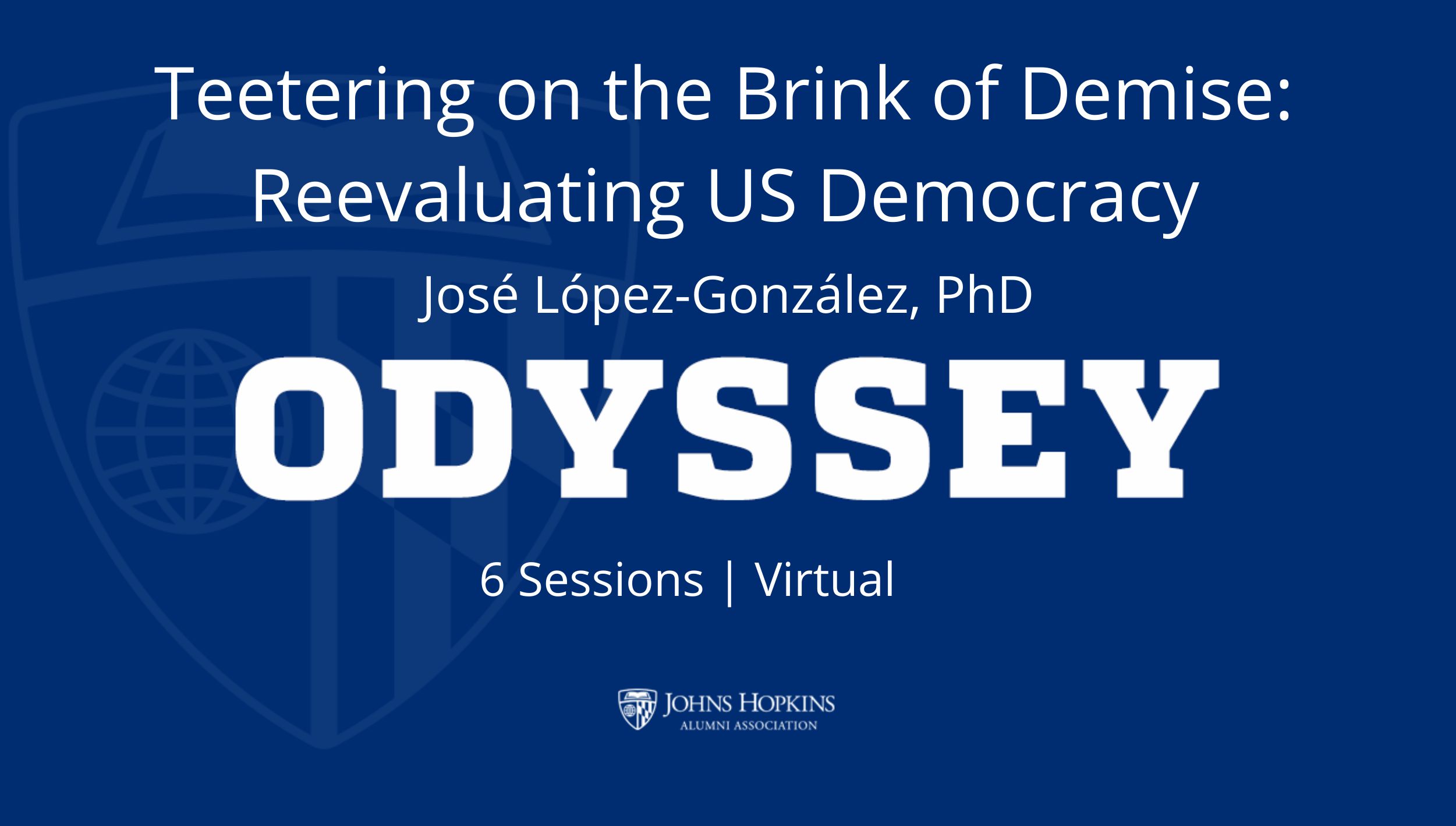Teetering on the Brink of Demise: Reevaluating US Democracy

Brought to you by Odyssey
October 6, 2021 - November 10, 2021
Wednesdays, 7:00 PM - 8:30 PM ET (9 course hours)
Current US democracy has been fractured by polarization and tribalism. The new normal of today’s politics is being influenced by the mass and immediate communications of the digital age. In this course, we will examine the roles of polarization & denialism in current US politics. We ask, “How strong are the forces of reason, culture and history to influence politics?” Finally, we explore influences as they shape cultural and historical changes while examining and debating the ways in which the personal and collective realization of civic virtues and the serious, thoughtful and committed pursuit of the common good --that will benefit all members of society-- have the power to prevent the future destabilization of democracy. Plus the belief that the improvement of democracy will be our permanent task. This course emphasizes active participation, autonomy-promoting education, and reasonable discussion.
Session 1 10/6 Introduction
Objective: Understanding the main elements of US democracy.
Session 2 10/13 Motivated Reasoning & Denialism
Objective: Analyzing the psychology of motivated reasoning and emotional denial.
Session 3 10/20 Politics and Economics of Polarization
Objective: Examining the political and economic factors of displaced working people.
Session 4 10/27 From Nov. 2020 election to Jan. 6 2021 Riot
Objective: Discussion of the GOP attempts to delegitimize the results of the presidential election.
Session 5 11/03 Weakness and Strengths of the US democracy
Objective: Discussion of the realities and possibilities intrinsic to the US constitutional system.
Session 6 11/10 The Future of New Civics
Objective: Discussing the need for the virtues of citizenship
Supplemental Materials
Suggested reading, It's Even Worse Than It Looks by Norman Ornstein & Thomas Man, 2016, 2nd Ed., Basic Books. If access is available, read the daily politics section of The New York Times and The Washington Post.
About the Instructor
José López-González, holds a BA in Economics from the Autonomous University of Nuevo Leon, Monterrey Mexico; MA in Economics from Williams College, Massachusetts; and MA and PhD in Philosophy from Johns Hopkins University. He is an economist, philosopher, and lecturer. He has worked as an Economist at the Investment Bank Financiera Aceptaciones and at the Mexican Federal Reserve Bank, both in Mexico City, Mexico. Dr. Lopez-Gonzalez taught philosophy in the Department of Philosophy at Loyola University for seven years and has been faculty in the Departments of Philosophy and Political Science at Towson University since 1996, teaching courses in Philosophy, politics, economics, and Latin America. Since 2010, he has been teaching interdisciplinary courses in philosophy, politics and economics as a lecturer at the Odyssey Program at Johns Hopkins University, and since 2014 at several campuses of the Baltimore County Community College. Dr. Lopez-Gonzalez is a Lecturer in the new program at the Alumni Relations Office at Johns Hopkins University. He has published articles in philosophy and economics and took courses in Micro and Macroeconomics at Harvard University.
Tuition Remission and Refund Policies
Full-time JHU faculty/staff, their spouses or same-sex domestic partners, JHU retirees and their spouses or same-sex domestic partners are eligible for tuition remission. The tuition remission form is required. All tuition remission forms and details on eligibility can be found here and should be returned to odyssey@jhu.edu.
After registration, tuition remission eligibility will be confirmed by the Odyssey registrar. If eligibility cannot be confirmed, you will be required to pay full tuition for the course. Under the terms of the University’s remission program, Hopkins employees must withdraw in writing at least five working days before the first class to receive a 100% refund. No partial refunds are given to JHU employees and affiliates.
Please visit the registration and policies page for more information.
While participating in on-campus events and meetings, participants must follow all public health guidelines required by Johns Hopkins University and Medicine at the time of the event. If you are not fully vaccinated, we require that you wear a face covering during your visit to campus, even when it is no longer required for those who are vaccinated.
While participating in off-campus events and meetings sponsored by the JHAA/JHM/JHHS participants must follow all public health guidelines mandated by the local jurisdiction and venue at the time of the event, including vaccination and masking and distancing guidance. Johns Hopkins strongly suggests that attendees who join in person be fully vaccinated.
